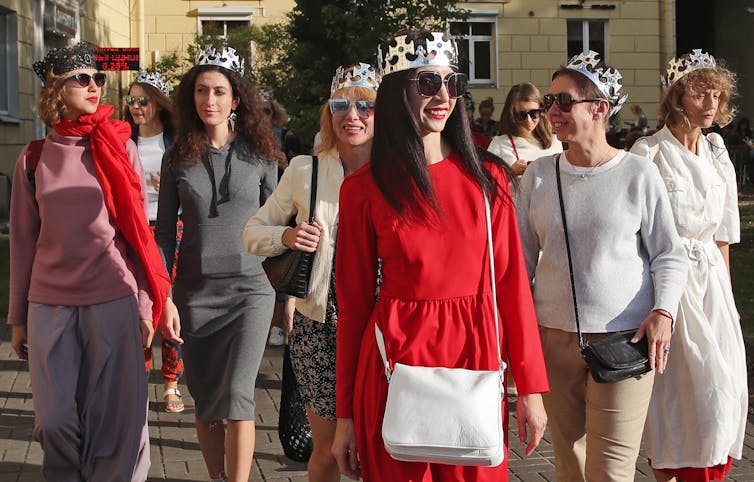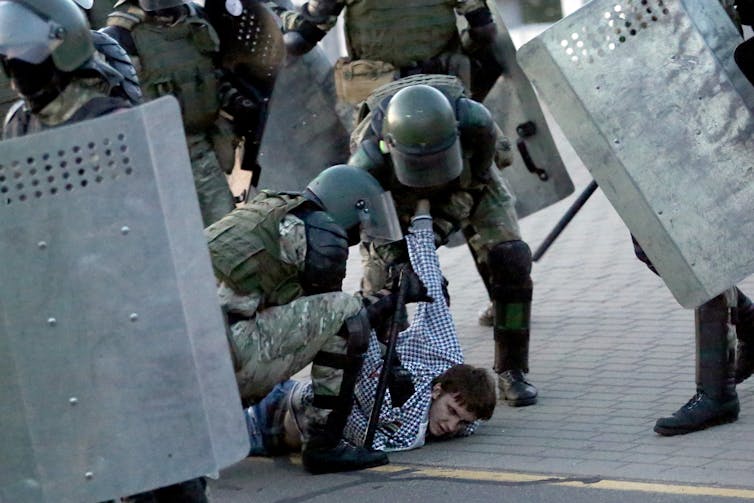Belarus' embattled leader secretly inaugurated himself, sparking new protests and global backlash
- Written by Tatsiana Kulakevich, Lecturer and Research Fellow at USF Institute on Russia, University of South Florida
As if a fraudulent election and months of mass protest weren’t enough drama for Belarus, its embattled authoritarian leader went ahead and inaugurated himself as president in a secretive Sept. 23 ceremony[1], held without prior announcement or live television broadcast.
This begins Alexander Lukashenko’s sixth term as president, at least according to Lukashenko and government-controlled Belarusian media. But the Belarusian people and at least 15 countries[2] – including the United States, Canada and Germany – say the country’s Aug. 9 presidential election was rigged and refuse to recognize Lukashenko as its rightful leader. The election delivered him 80% of the vote[3], an impossibly favorable result given the clear popular discontent with his regime.
While intended to assure Lukashenko’s future, the secret inauguration appears to be backfiring.
Crumbling legitimacy
Lukashenko did not invite foreign diplomats or dignitaries to his self-declared inauguration ceremony. Only a few hundred hand-picked regime insiders attended.
Not even Russia, Lukashenko’s main booster after the disputed presidential vote, was aware of the planned inauguration[4] ceremony. Moscow, like the Belarusian people, learned Lukashenko had assumed the presidency only after the fact.
In Belarus, news of the self-inauguration triggered widespread new demonstrations[5] in the street. Online, people staged satirical inauguration “flash mobs,” dressing up and inaugurating themselves with fictional titles.
 Women don their own crowns after Lukashenko’s secret inauguration Sept. 23.
Natalia Fedosenko\TASS via Getty Images[6]
Women don their own crowns after Lukashenko’s secret inauguration Sept. 23.
Natalia Fedosenko\TASS via Getty Images[6]
Another mass protest, dubbed the “people’s inauguration of the real president[7],” was held Sept. 27 to declare Sviatlana Tsikhanouskaya – Lukashenko’s main election rival – as the country’s legitimate leader.
Lukashenko’s stunt has left him isolated, both locally and internationally.
In coordination with neighboring Estonia and Lithuania, Latvia announced on Sept. 25 it had imposed an indefinite entry ban on 101 Belarusian officials[8]. The European Union is considering sanctions against about 40 high-level Belarusian officials[9], including the country’s interior minister. The U.S., Canada and the U.K. all say they could impose sanctions within days[10].
Shortly after the disputed election, Russia gave Belarus a US$1.5 billion emergency loan[11]. That was a lifeline to Lukashenko’s regime, though not enough to save a tanking economy. Once a tech-startup magnet[12], Minsk is now seeing companies flee.
What’s next
As an Eastern Europe researcher[13] who was born and raised in Belarus, I can attest this is not the first time Lukashenko has been at odds with the world.
The past four presidential elections in Belarus – all of which Lukashenko won with upwards of 80% of the vote – were not recognized as free and fair[14]. The Belarusian government was sanctioned for falsifying results in 2006 and 2010[15].
But this time feels different. In an unprecedented political crisis, all Europe is uniting around serious sanctions intended to pressure top regime officials into reconsidering their support of Lukashenko. Sanctions also effectively give Belarus’ pro-democracy protesters an international stamp of approval.
Since 1994, populist Lukashenko has rested his legitimacy on his mission to provide stability and protect the common people[16]. Now, amid months of protests, he’s forced to rely on coercion and violence to stay in power.
 Ever since the contested August election, crushing dissent has been Lukashenko’s main strategy for staying in power.
Tut.By/AFP via Getty Images[17]
Ever since the contested August election, crushing dissent has been Lukashenko’s main strategy for staying in power.
Tut.By/AFP via Getty Images[17]
But research shows[18] that repression alone is too costly a means of sustaining authoritarian rule. Even dictatorial regimes need a certain level of legitimacy to survive[19].
The fact that Lukashenko felt compelled to hold a tiny, secret inauguration ceremony suggests that even he knows he’s in trouble. At this point, Lukashenko’s fate probably depends on Vladimir Putin[20], who has taken a wait-and-see attitude about his fellow post-Soviet strongman.
[Get our best science, health and technology stories. Sign up for The Conversation’s science newsletter[21].]
After Lukashenko’s secret inauguration, Putin’s press secretary, Dmitry Peskov, refused to comment on what he called an “internal decision of the Belarusian leadership[22].”
If Putin continues to support the Belarusian ruler it would probably assure Lukashenko stays in power. But there’s a cost for Russia to intervening in Belarusian affairs, particularly if that means assisting in Lukashenko’s violent crackdown on protesters[23].
Doing so would pit Putin against Europe, and could push Belarusians who seek a greater political voice away from Russia and toward the West.
References
- ^ secretive Sept. 23 ceremony (www.theguardian.com)
- ^ 15 countries (charter97.org)
- ^ 80% of the vote (www.nytimes.com)
- ^ aware of the planned inauguration (tass.com)
- ^ widespread new demonstrations (www.themoscowtimes.com)
- ^ Natalia Fedosenko\TASS via Getty Images (www.gettyimages.com)
- ^ people’s inauguration of the real president (uk.news.yahoo.com)
- ^ on 101 Belarusian officials (eng.lsm.lv)
- ^ about 40 high-level Belarusian officials (www.rferl.org)
- ^ impose sanctions within days (www.rferl.org)
- ^ US$1.5 billion emergency loan (www.themoscowtimes.com)
- ^ a tech-startup magnet (www.wsj.com)
- ^ Eastern Europe researcher (tatsianakulakevich.com)
- ^ were not recognized as free and fair (news.un.org)
- ^ 2006 and 2010 (news.house)
- ^ provide stability and protect the common people (www.nouvelle-europe.eu)
- ^ Tut.By/AFP via Getty Images (www.gettyimages.com)
- ^ research shows (www.brookings.edu)
- ^ dictatorial regimes need a certain level of legitimacy to survive (www.tandfonline.com)
- ^ probably depends on Vladimir Putin (www.brookings.edu)
- ^ Sign up for The Conversation’s science newsletter (theconversation.com)
- ^ internal decision of the Belarusian leadership (www.startribune.com)
- ^ assisting in Lukashenko’s violent crackdown on protesters (www.washingtonpost.com)
Authors: Tatsiana Kulakevich, Lecturer and Research Fellow at USF Institute on Russia, University of South Florida

